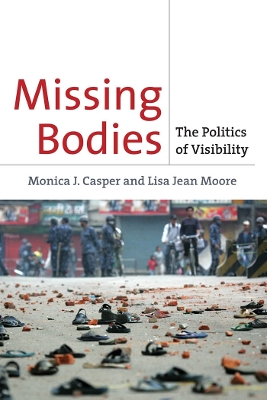Biopolitics
2 total works
We know more about the physical body—how it begins, how it responds to illness, even how it decomposes—than ever before. Yet not all bodies are created equal, some bodies clearly count more than others, and some bodies are not recognized at all. In Missing Bodies, Monica J. Casper and Lisa Jean Moore explore the surveillance, manipulations, erasures, and visibility of the body in the twenty-first century. The authors examine bodies, both actual and symbolic, in a variety of arenas: pornography, fashion, sports, medicine, photography, cinema, sex work, labor, migration, medical tourism, and war. This new politicsof visibility can lead to the overexposure of some bodies—Lance Armstrong, Jessica Lynch—and to the near invisibility of others—dead Iraqi civilians, illegal immigrants, the victims of HIV/AIDS and "natural" disasters.
Missing Bodies presents a call for a new, engaged way of seeing and recovering bodies in a world that routinely, often strategically,obscures or erases them. It poses difficult, even startling questions: Why did it take so long for the United States media to begin telling stories about the "falling bodies" of 9/11? Why has the United States government refused to allow photographs or filming of flag-draped coffins carrying the bodies of soldiers who are dying in Iraq? Why are the bodies of girls and women so relentlessly sexualized? By examining the cultural politics at work in such disappearances and inclusions of the physical body the authors show how the social, medical and economic consequences of visibility can reward or undermine privilege in society.
The first systematic overview of the notion of biopolitics and its relevance in contemporary theoretical debate
The biological features of human beings are now measured, observed, and understood in ways never before thought possible, defining norms, establishing standards, and determining average values of human life. While the notion of “biopolitics” has been linked to everything from rational decision-making and the democratic organization of social life to eugenics and racism, Thomas Lemke offers the very first systematic overview of the history of the notion of biopolitics, exploring its relevance in contemporary theoretical debates and providing a much needed primer on the topic.
Lemke explains that life has become an independent, objective and measurable factor as well as a collective reality that can be separated from concrete living beings and the singularity of individual experience. He shows how our understanding of the processes of life, the organizing of populations and the need to “govern” individuals and collectives lead to practices of correction, exclusion, normalization, and disciplining. In this lucidly written book, Lemke outlines the stakes and the debates surrounding biopolitics, providing a systematic overview of the history of the notion and making clear its relevance for sociological and contemporary theoretical debates.

